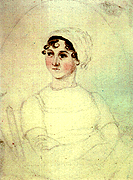
Guest post by Elizabeth Curtis
Elizabeth M. Curtis recently graduated with an M.A. in women’s studies from the George Washington University, where she wrote her thesis on blogging and the formation of feminist networks online. She blogs regularly at A Blog Without a Bicycle.
1. With Prejudice
When sitting in a theater watching the trailer for Becoming Jane in early July, I turned to my movie-watching date and observed, “That film cannot end well.”
My comment, which puzzled my companion at the time, was based on my undergraduate engagements with Austen’s novels in English seminars. Doing critical readings of Jane Austen’s leading ladies at a women’s college – what feminist literary theorist could ask for anything more, right? Studying Persuasion or film adaptations like Clueless or Bridget Jones’s Diary in my courses, though, quickly led me to conclude that I was not quite ready for scholarly critiques of my girlhood heroines and an author I idealized. I’m sure you can imagine the horror I felt when presented with a Lacanian reading of Austen’s novels as pathological and obsessive ruminations on her own “failed” love life.
And now a movie expose of Austen’s real-life romances? Oh, dear. Marketed with the tagline, ““Their love story was her greatest inspiration,” I could only imagine what a historical yet fictional film could do to poor Jane…and it wasn’t very becoming at all.
The early reviews that I read about Becoming Jane did little to assuage my anxiety. On Salon.com, Stephanie Zacharek described Becoming Jane as a <a href="
http://www.salon.com/ent/movies/review/2007/08/03/becoming_jane/”>”weird effort to remake Austen’s life — about which we actually know very little — into a genteel, tasteful Harlequin romance.” Questioning the slim historical evidence that was used as the foundation of this flick (the Jane Austen Society of North America provides a great analysis of fact versus fiction), Zacharek critiques the way in which this film is forced to fit a contemporary sense of romance. BBC Movies provided a similar yet slightly more positive review. There Stella Papamichael wrote, “Mercifully, director Julian Jarrold resists turning a literary icon into a 19th century Bridget Jones, but this story does take a few flights of somewhat dubious fancy in speculating on her relationship with the real Mr Darcy.” None so reassuring.
So it was with great trepidation that I sat down in a theater to finally see Becoming Jane for myself. Personally, I’ve always thought of Jane Austen as one of the great feminist figures in literary history (of course, as it is with most things feminist, whether Jane Austen and her characters are feminist friends or foes is, well, debated) – and I was worried that her dating life would get more attention than her prolific prose thus leaving audiences to forget her accomplishments as an author and to focus instead on a soap opera version of her so-called life.
2. With Pride
I must confess that I was pleasantly surprised by Becoming Jane. Sure, I’m a sucker for period pieces – seeing them is a hobby bordering on obsession for me. But I think most Jane Austen fans will be tickled by the clever blending of her fictional characters with the personalities of her real-life companions in the film.
There were some great feminist-y – though stereotypical – moments in the film, too. You go with that cricket paddle, Jane! You go, girl! I especially appreciated the girl-on-girl mentoring action. Whether it was writerly advice bestowed by Mrs. Radcliffe or sisterly advice shared by Cassandra, it always warms my heart to see strong, positive female relationships in major motion pictures. Because, really, the mean girls just get too much screen-time.
My major issue with the film comes from what I found to be mixed messages about combining career and marriage. Perhaps this issue is a bit too much on the contemporary scene to avoid being incorporated into this historical fiction, but I found myself wishing that I could rewrite history so that Anne-Hathaway-Jane-Austen really could have it all. Women receive so many negative messages in the media about the “consequences” of choosing a career in terms of their personal lives…Wouldn’t it be nice to see a more positive portrayal – just once?
To be fair, Jane’s on-screen love life was thwarted more by class and circumstance than by career. But when questions like “But how will you write?” were posed as counters to Jane’s proposed romantic schemes or when a successful writing career is presented as a consolation for the loss of a lover…It just makes me more aware of the (unfortunate) timelessness of the struggle for women to find a work/life balance that allows them to reach all of their aspirations – personal and professional.
I can’t think of a better place, though, to discuss the life of this literary lady, its cinematic portrayal, or the film’s messages about professional writerly woman than Girl with Pen.


Comments